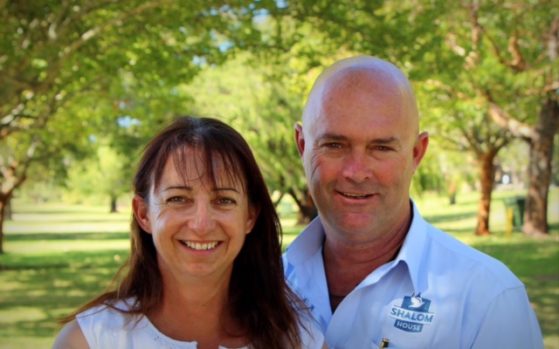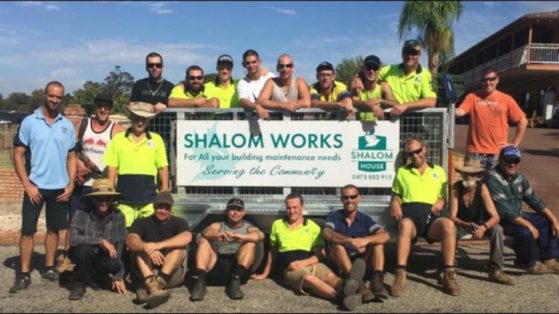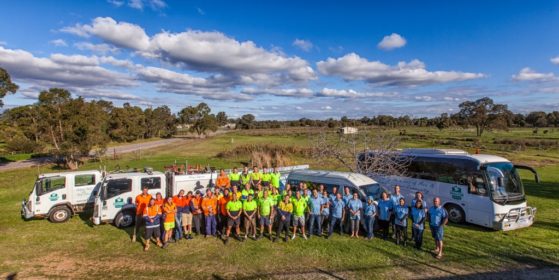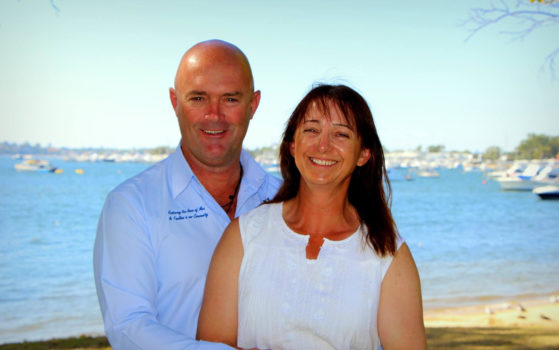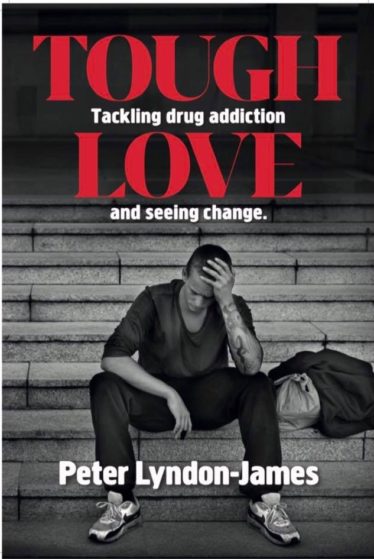Interview with Peter and Amanda from Shalom
This month I interviewed Peter and Amanda Lyndon-James, who run Shalom House, a drug rehab that is transforming lives in the Swan Valley. Amanda is a horticulturist who was raised on a farm in Wongan Hills. Peter, a ward of the State from age nine, spent his childhood locked up or on the streets. Pete became a drug addict and dealer, spending time in every WA jail. Peter's life has completely changed and this year he won the West Australian of the Year Award and Telstra Business Award for his work with Shalom. Shalom also featured on Australian Story recently.
I was introduced to Shalom last year through my hubby, who works for Castlerock Building, a company that employs Shalom men to give them a second chance at life. I have sung at a few of the Shalom family nights and am always in awe of seeing the men's lives transform before my eyes.
[embed]https://www.youtube.com/watch?v=L2KVcCecSUo#action=share[/embed]
Interview with Peter and Amanda Lyndon-James
Q1. It is amazing that Shalom House is helping over 100 men overcome drug addiction! Have you noticed a common thread between the men at Shalom House that caused them to start taking drugs?
A lot of the men come in with anger, bitterness, resentment and unforgiveness. This is usually due to circumstances they’ve faced while growing up. A common trait is arguing with the parents and a lot of the men have seen their parents arguing and quite often separating. When the parents separate it splits up the family and the child takes offense, starts rebelling and they then turn to drugs and head in downward spiral. A lot of it has to do with the selfishness of the parents and the decisions that they make, they don’t take the time to explain to the child what is happening and they are left confused.
Q2. What are some practical things parents can do to deter and prevent their children from taking drugs?
Parents can use examples and educate the children on what the consequences are of taking drugs e.g. if you take drugs you will end up in an institution or jail. Hand them over to the consequences e.g. if they get into trouble with the police for the first time don’t bail them out straight away. Leave them in a lock up for a little while so they can see where drugs will take them.
Q3. If a parent discovers their teenager is on drugs, what should they do?
Test the child using a urine testing kit to see exactly what drugs they are on. If this is the first time the parent has been made aware of their drug taking the parent warns them and tells the child that there is to be no drug taking on or off the property if they want to live in their home. Draw up a Memorandum of Understanding which puts into writing that the child gives the parents’ permission to randomly drug test them and if they are found to have drugs in their system or they are caught using drugs in the house they will have to leave the home immediately.
Parents need to tell the child that they love them and they are there to work with them but they won’t tolerate drugs in the home. If the teenager is no longer living at home and is taking drugs just continue to love on them but never give them money, pay their bills, buy their groceries, etc. Give them a phone call to have a chat and tell them that you love them but don’t lecture them or judge them. When they ask for help to change their life pass on the phone numbers of rehabs that can help them but don't ring for them.
Q4. What advice would you give to a parent who has raised their child to be a responsible teenager, but their child chooses a boyfriend or girlfriend who is a drug addict?
The parent can pull their child aside in love and say “Listen, you’re a grown adult now and I don’t want to hurt you, I don’t want to be rude or disrespectful or tear you down. I don’t want to devalue you and I don’t want to say anything that speaks against you or brings condemnation in your life, that’s the last thing I want to do. I want to acknowledge that I have no right even now speaking into your life as you're a grown adult. So what I’m about to say is because I love you and for no other reason, please don’t take offence to what it is I’m about to say. I really don’t agree with drugs and substances because I know what they'll do to you and to the whole family. I can't violate your free choices and I can't violate your free will but I need you to know where I stand with this. As far as we're concerned we can't have drugs around. If this is the path you choose to go that is your choice. Please respect our decision not to want drugs and substances around us."
If the child understands that then the parent needs to let them live their life and not be judgmental. Saying these things at the beginning will lay a foundation and will position the parent to be the person the child comes to for help or advice. If the parent puts condemnation and judgement on the child it will push them away.
Q5. Pete it appears that being institutionalised as a child set you on the wrong path. What could we do to improve things for children today who find themselves in the same situation you were in?
Provide counselling for the child to explain to them why they’re in the Children’s home, but depending on what the child has been through will determine how they receive it. The main thing is provide unconditional love for the child and to try to build a relationship with the child so that they can go to someone with any questions that they’ve got and they’re not put in a position where they’re leaning on their own understanding and they’re not trying to work things out in their own mind. Educate the child in the decisions that their parents and they’ve made and include them in the decision making and the process. A lot of people try to hide things from the child, but the child’s not stupid. Hiding the truth from the child gives place for wrong thoughts and lies to enter into their minds and their hearts.
Q6. If a mum discovers her partner is a drug addict, what should she do in the interest of her family's safety and wellbeing?
Warn the partner the first time, tell them that you don’t want them using drugs on or off the property, that’s not the person they married. The person that isn’t using the drugs needs to speak up for the child in the best interests of the child as they can’t speak up for themselves. They would warn the partner the second time and then on the third time if they still use drugs the partner needs to move out or ask them to leave or the family move out. They need to set clear boundaries before the partner can come back in. People will make the excuse why they can't make this decision saying that they can’t be a single parent with kids because they don’t have an income and won’t be able to pay the bills, pay the rent, buy food, etc. but that will get worked out later. Unfortunately, the family’s life has to be adjusted to suit, but the family has to do whatever they need to do.
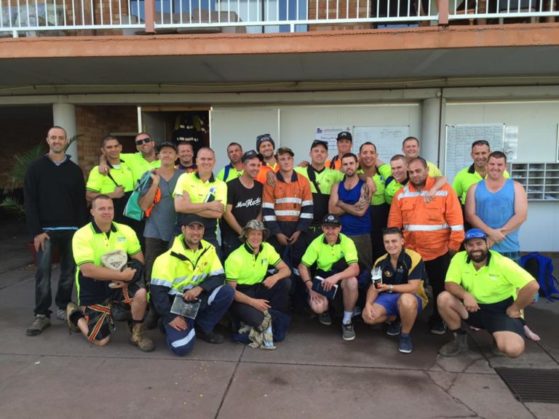 Q7. If a grandparent finds out their adult child is on drugs, what could they do to protect their grandchildren?
Q7. If a grandparent finds out their adult child is on drugs, what could they do to protect their grandchildren?
Get the other adult children together to see if any of them are willing to do family intervention. Nominate someone to be the team leader, someone to call the shots that isn't emotionally connected that can act in the best interest of all parties. Someone that won't make decisions out of emotion, that don't have any bitterness or unforgiveness, someone neutral. Bring the family together and the team person can say to the person on drugs that what they're doing is not ok. Contact Department of Child Protection just so they are informed of the situation. The grandparents need to be prepared to look after the children if they step in.
Q8. If a parent has messed up through drug use, how should they go about reconciling with their partner, children and family?
The parent’s actions will speak louder than their words. The parent needs to go to their partner and children and apologise for what they've done. The family need to give the parent a week’s space to detox off the drugs. The parent should do an initial drug test to show all of the drugs that are in their system and then offer to do random drug tests, cut off all ties with friends, snap their sim phone card, put in place a three-strike and you’re out policy.
Q9. Why is there a drug problem in Australia and how can we fix it?
Drugs and substances give a person a short term fix, they hide reality and give a coping mechanism. People drink alcohol because they enjoy it and people take drugs because they enjoy it, both are addictive. We can fix the problem by handing people over to the consequences of their choices, get all of the parties on the same page. Government, Health departments, rehabs, etc. aren't working together as a team, they're all doing it different so the strategy needs to be rethought.
Q10. How can the community support Shalom House?
Shalom is currently looking for a property or premises where they can have a base, somewhere to call home. Shalom has currently out grown all of their houses, the offices, the church, truck parking, counselling offices, etc. Shalom does not seek money or donations from anyone but if people in their heart get prompted to give then they can donate. Shalom is always looking for volunteers whether it’s mentoring, driving men to appointments, discipleship, admin, etc.
Tough Love
As a singer, I donate 10% from all my live music bookings to Shalom House, because I really love the work they do in the community. If you'd like to donate you can find out more HERE. I have also read Pete's book Tough Love, a manual for how to handle a person on drugs successfully, and I highly recommend it. Tough Love can be purchased at any of the Shalom House seminars, from the Shalom Office at 6571 West Swan Road, West Swan, or online. If someone you know is struggling with drug addiction, please pass on Pete's number 0473 883 914.

